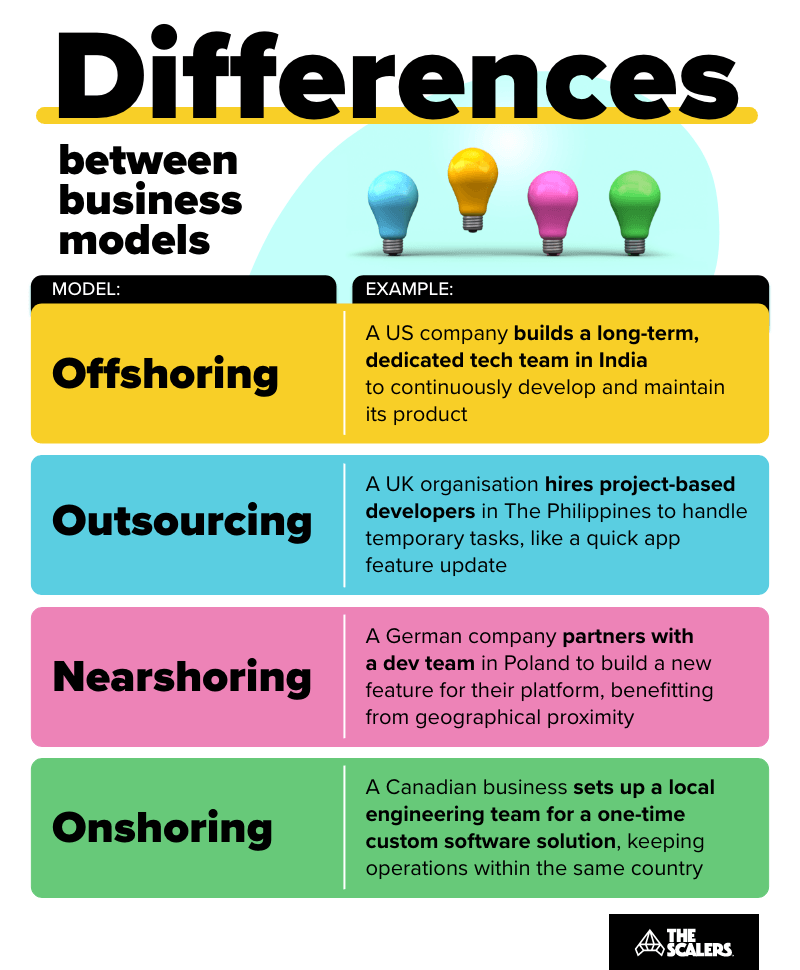Wondering what offshore software development is all about? Then, this article is for you.
Whether you’re a seasoned tech leader struggling to find specialised engineering talent locally or just casually looking to learn about this hiring and engagement model, this guide will help you navigate all things offshoring.
Drawing on our extensive experience building over 80 offshore tech teams in the past 10+ years, we’ve put together what we’ve learned in this concise summary. This includes a clear definition of what offshore software development (really) is and its benefits, guidance on where to build a world-class offshore dedicated team, industry trends, and other valuable insights.
We hope you find it helpful!
What is offshore software development?
Offshore software development refers to the process of establishing an overseas tech team to design, build, and maintain software. This team is meant to support a business’s long-term growth and ongoing operations.
Organisations that go offshore typically do so to hire professionals with niche skills they can’t find in their home or neighbouring countries, often turning to talent-rich locations such as India.

Discover how to scale development teams in 2023 and beyond
DOWNLOAD EBOOKThe large pool of elite developers they can access in tech hubs like Bangalore — plus the ability to scale quickly and cost-effectively — allows companies to increase their output and improve their technical expertise without significant stress, inconvenience, or expense.
To maximise efficiency, businesses that leverage offshoring set up a new office in the country of their choice. These fully equipped facilities are known as offshore development centres, a dedicated space for their offshore teams to collaborate and innovate at speed.
What is the difference between offshoring, outsourcing, nearshoring, and onshoring?
Despite its similarities, offshoring isn’t the same as outsourcing, nearshoring, and onshoring:
- Offshoring involves building high-quality, long-term tech teams with specialised talent in another country, generally thousands of miles away from an organisation’s headquarters.
- Outsourcing means hiring professionals for temporary or short-term work.
- Nearshoring consists of setting up an engineering team in a neighbouring country with minimal time zone differences.
- Onshoring refers to establishing a tech team locally to ensure direct oversight over execution and real-time collaboration.
Check out our article on the key differences between offshoring, outsourcing, nearshoring and onshoring for an in-depth analysis of the topic.

Is offshore software development ethical?
Short answer, yes. Offshore software development is ethical when done responsibly.
Most business leaders are concerned about the ethics of offshoring, particularly regarding the quality of work, working conditions, wages, and the potential loss of local jobs.
But the reality is that countries like India produce highly skilled engineers, working in modern, well-equipped environments that prioritise employee well-being and fair wages, adjusted for local living costs.
If you’re still doubting if offshoring is (really) ethical, check out our guide on the ethics of offshoring for a deeper analysis.
What are the benefits of offshore development?
Offshore software development offers numerous advantages to companies of all sizes, from startups to major corporations.
These are its four key benefits:
Accessing niche top talent
When offshoring, organisations can tap into global top talent, regardless of location. From the strong work ethic of Eastern European developers to the high English proficiency and niche programming skills of Indian engineers, the world becomes (quite literally) their talent pool.
For companies headquartered in the US, UK, or other Western regions, building an offshore team is an excellent solution to the scarcity of specialised professionals in their countries.

Can’t find the skills you need at home? Stop searching and start scaling
LEARN MOREIndeed, the U.S. Bureau of Labor Statistics predicts demand for nearly 170,000 developer positions annually until the decade’s end — but there aren’t enough skilled developers to fill these roles.
That’s not a problem in popular offshore destinations like India. The Asian nation produces 1.5 million engineering graduates yearly, ready to embark on professional careers and build software for international organisations.
As demand for AI, machine learning, and data science experts rises, Indian developers are now more trained in these emerging fields than ever before.
Getting great value for money
Offshore software development is a hiring and engagement model known for its cost-effectiveness. Organisations that go offshore not only reduce operational costs but also hire high-quality talent for a fraction of what they’d pay in their home countries.
As a result, the cost of offshore development is significantly lower than hiring locally.
For example, if a CTO wants to expand their tech team with a software engineer in London, they’d need to pay a median salary of $121,802. The same specialist in India commands a median salary of $30,903, nearly four times lower.
Scaling quickly
Scaling an offshore software development team is faster than expanding a local team.
And easier.
Some of the best offshore development companies offer flexible cooperation models that allow organisations to build, manage, and scale engineering teams on demand.
Let’s say you are a tech leader and set up a dedicated development team of five engineers. After a few months, your business grows, and you need more developers to design a new product and meet your customer expectations.
That’s where your offshore partner comes in. You just need to ask them how many engineers you need to scale your team, and you’ll get top-notch tech specialists in no time.
Focusing on core business activities
A reliable offshore software development company handles recruitment, administration, payroll, and other processes for their partners, giving them peace of mind.
And there’s nothing like the security of having a partner business leaders can trust while they prioritise other crucial aspects of their organisations.
When a firm decides to go offshore, its leadership team gets time to focus on core business activities, interact with potential clients, and expand its offering. In the meantime, their offshore partner handles hiring, onboarding, and engaging top developers, among other time-consuming tasks.


If you want to know more about offshoring’s cons, read our guide on offshore development benefits.
What are offshore developers, and what do they do?
Offshore developers are highly specialised professionals who act as an extension of an organisation’s in-house tech team, bringing skills and expertise that may be lacking internally.
For example, a FinTech can decide to hire Quant developers via offshoring to build sophisticated risk models and trading algorithms.

Unlike freelancers and project-based engineers who juggle multiple clients, offshore developers are fully committed to businesses and work just for them. They are 100% focused on the company they collaborate with, using the same tools and processes as the headquartered team.
The best offshore development companies build teams for their partners with culturally aligned professionals who understand the company’s mission and vision and share the same values.
So, who should hire offshore developers?
Generally, two types of organisations leverage offshore software development:
- Non-technical core businesses. E.g., retail or hospitality firms that need help transforming their existing website or developing digital products for their customers.
- Companies seeking to expand their in-house development team with niche talent. E.g., financial corporations that want to increase their business’s value and grow their tech proficiency.
The first type of organisation lacks software expertise and requires competent developers to maintain and build their technology. The second already has an in-house development team but wants to scale up to take on more significant contracts, deliver more value to users or outpace their competitors.
In both cases, hiring offshore developers is an ideal solution since highly qualified engineers are hard to find locally.
Where to hire offshore developers?
Now that we’ve covered offshore software development, its benefits, and what offshore developers do, it’s time to list the best regions to hire top tech talent.
Below is a breakdown of the main regions, but we have also prepared an in-depth guide on the top countries for building offshore teams you can read to gain a deeper understanding of each location’s strengths.

Asia
India is a global leader in IT offshoring. Tech hubs like Bangalore support this claim: 90,000 engineers graduate from Bangalore’s universities yearly, and the city is home to over one million software developers.
Given the lower cost of living compared to Western countries, setting up an offshore software development team in India can be a cost-effective option for businesses headquartered in metropolises like New York, London, or Paris.
Another Asian country organisations should consider for offshoring is The Philippines. This tropical archipelago boasts strong English proficiency, with professionals excelling in both technical and business language domains.
However, the country is experiencing a tech talent shortage affecting the overall quality of engineers in the Asia-Pacific region. You’d typically pay less to build an engineering team in the Philippines than in India, but you’d also hire less qualified developers.
The average offshore software development rate in these locations is €28/h.
Eastern Europe
Offshoring to Eastern Europe is an attractive business opportunity for US and Western European companies.
In particular, for organisations that require constant, real-time collaboration with their offshore developers. The minimal time zone difference is a plus for better cooperation and reduced communication gaps.
Countries like Poland and Ukraine are ideal choices for organisations seeking developers with strong technical proficiency for short-duration projects.
Engineers in these regions charge €32/h on average.
Latin America
Latin America is becoming an increasingly popular destination for offshore software development. Countries like Colombia, Mexico, and Argentina are investing in infrastructure and technology to attract international companies to invest in the region.
Medellin, Mexico City, and Buenos Aires are evolving into modern tech hubs with a talent pool of expert developers who share a strong cultural affinity with Western organisations.
The downside of hiring Latin American offshore developers is that some regions have low English language proficiency. This situation causes difficulties in gathering feedback and understanding project expectations.
On average, companies can expect to pay €37/h for developers in Latin American countries.
How to choose an offshore partner
If you’ve read this far, you’re probably a business leader already interested in hiring world-class developers via offshoring but unsure how to access talent pools in popular tech hubs.
For that purpose, you need to collaborate with a reliable offshore partner to help you find and hire top talent.
Follow these five steps to choose the right partner for your business:
- Identify your needs. Define what it’s you’re looking for and set your business goals. If you want to build a development team for long-term collaboration, you should filter your search for partners who specialise in these cooperation models.
- Assess communication. It may sound obvious, but finding a partner who speaks your language is crucial. Search for companies with high English proficiency and any additional languages of your choice, and ensure communication with them is responsive and clear.
- Verify developer quality. Every partner claims to offer the best developers, but most don’t. Check if partners are living up to their promises when offering world-class developers. Ask them where they are sourcing talent, what technologies engineers specialise in, and their experience.
- Evaluate security and data protection measures. Cybersecurity is essential for protecting sensitive data and mitigating potential threats. Make sure your partner follows the latest security and privacy guidelines to keep your software safe.
- Do a background check. Learn more about the partners’ experience working with international organisations. Look for testimonials, check their portfolio and analyse if they’re trustworthy.
Want to know more about the process of picking an offshore software development company? Our proven guide on choosing the right offshore partner includes everything you must consider before making a choice — including the key questions you should ask their leadership team.


How to manage an offshore team
Once your partner builds your team, you might find yourself at a crossroads, trying to figure out how to collaborate with your new engineers.
To manage your offshore software development team, try to do the following:
Share your mission and vision
Most organisations view their offshore team as a mere execution partner for their development processes. That’s a mistake you can’t afford to make.
Establishing a connection with your offshore team from day one is crucial.
Introduce your organisation’s goals and requirements and share your company’s vision for the future. The more your engineering team knows about your brand, what you want to build, and why, the closer you’ll be to unlocking their full potential.
It’s all about building trust, fostering open communication, and creating a sense of shared purpose.
Bridge the culture gap
You’ll encounter cultural differences when working with offshore teams thousands of miles from your US or European headquarters.
Your goal as a tech leader is to nurture a unified culture of belonging across both locations.
Make your offshore team feel appreciated and recognised. Visit your offshore team occasionally, conduct ice-breaker video calls so both teams get to know each other and always be vocal about how you feel about their collaboration.
A Chief Happiness Officer (CHO) plays a pivotal role in this scenario.
Offshore partners with a people-first approach, especially in India, offer companies a dedicated CHO to foster a safe and appreciative work environment and train employees on soft skills. Their contribution is crucial to building a culturally aligned team that is committed to the organisation’s long-term goals, mission, and vision.
Communicate effectively
Poor communication costs software teams millions in fixes and delays. While this affects in-house teams, this issue is even more pronounced with offshore teams. Language and cultural barriers, time zone differences, and physical distance make clear and compelling communication more important than ever.
To avoid misunderstandings and delays, use the following communication channels between your local and offshore teams:
- Email: Share official communication, schedules, and project meeting notes via email.
- Instant messaging: Tools like Slack and Skype work best for quick clarifications, status updates, and queries.
- Productivity tools: Check task status and performance with Jira, Asana, Basecamp, and other project management tools.

Offshore software development trends
What are the emerging trends in offshore software development that organisations should watch out for? How will innovation in the tech industry impact the way teams are built in the coming years?
To answer these questions, we’ve compiled a list of the upcoming offshoring development trends, focusing on the technologies and roles that will shape the future of the industry.

- Machine learning and large language models (LLMs): The recent AI boom also influences software development and, consequently, offshoring. Organisations are expected to demand AI developers to work on machine learning models and LLMs in the near future. In our ebook Scaling Beyond Borders we explain exactly how to build future-proof dev teams in the AI era.
- Cloud computing: While cloud computing isn’t a new technology, tech and business leaders predict more organisations will move their operations to the cloud. Time to double down on cloud developers?
- Big Data and analytics: As more companies realise the value of analysing vast datasets in real-time to uncover trends, make smarter decisions, and predict future outcomes, the demand for skilled data scientists, engineers, and analysts will skyrocket.
- Web 3 and blockchain: These technologies are gaining traction, and while adoption is still evolving, businesses are increasingly exploring decentralised solutions. As these technologies grow, the need for blockchain and Web 3 experts will rise, though their full impact remains uncertain.
Why you should consider offshoring to India
There are many misconceptions about offshore software development that organisations often believe and stop them from building engineering teams in countries like India.
Concerns about work quality, working conditions, and communication are all too common. The reality is that these are just outdated assumptions about offshoring. But there’s a better way, and there are offshore companies in India changing that narrative.
These are some of the advantages of offshoring to India:
- India has an abundant pool of top engineering talent, with 5.8 million specialised developers living and working in thriving tech hubs.
- Indian engineers possess a strong command of the English language and excel in cooperating with international companies.
- Moving operations to the country is cost-effective, given the lower cost of living and favourable exchange rates.
- India has a well–established IT infrastructure as well as Special Economic Zones (SEZs) and software parks in cities like Bangalore, Hyderabad, and Chennai.
- India is known for being culturally compatible with Western countries, so it’s easy to align business practices with offshore teams.
Plus, the country has multiple offshore partners ready to help you build scalable software development teams. That’s exactly what we do at The Scalers.
The Scalers’ offshore software development model
At The Scalers, we work with organisations worldwide — from the US to Europe and Australia — assembling dedicated teams of top-notch developers in Bangalore, ‘The Silicon Valley of Asia.’
With our unique offshore model, we’ve assisted partners in multiple sectors setting up elite tech teams with the top 1% of Indian talent. These professionals have been crucial in driving companies to the top of their industries:
- Ykone, a French MarTech, launched an influencer marketing platform with the help of an 8-strong dedicated product team.
- Johnson Health Tech, a Taiwanese manufacturing company, achieved 24-7 development operations thanks to an 8-engineer ODC — and is planning to expand to 20 engineers in 2025 to cover more product development.
- Preqin, a UK FinTech, scaled to a 450+ person R&D Centre, which was pivotal in launching their new flagship product and accelerating product development.


Our model is built around creating dedicated teams fully focused on their partners’ goals and culturally aligned with their peers in the US, Europe, or Australia. By handling tasks like HR, legal, administration, and infrastructure — along with daily engineer engagement — partners can rest easy knowing their team is performing at its best.
Do you want to learn more about our unique (and proven) approach to offshoring and start scaling your tech team? Drop us a line, and let’s discuss ways of transforming your business today!
In summary: the only offshore software development guide you’ll ever need
We hope this article has helped you better understand the concept of offshore software development, how offshore developers can help organisations thrive, and why India is an excellent place to build a top tech team.
Bear in mind that the success of offshoring boils down to two essential factors: finding the right tech talent and building a solid partnership with a reliable offshore company.

If you want to keep exploring offshore software development, check out our other articles on building high-performing, resilient tech teams. You can find them below!
















